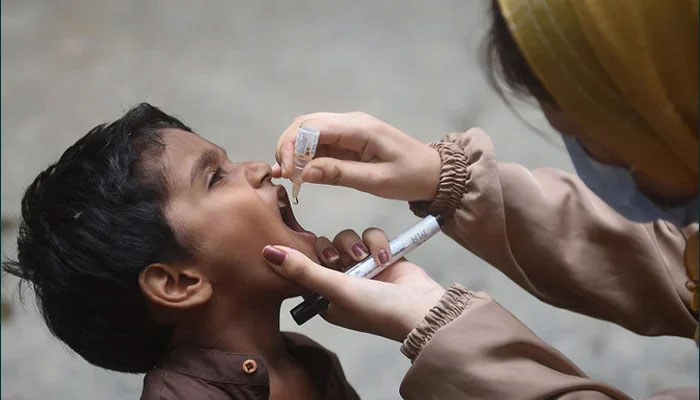The final mile
Polio had been eradicated in all countries, except Afghanistan and Pakistan
Few people have done more to help the world eradicate polio than Microsoft co-founder Bill Gates. Known for his charitable endeavours via the Bill & Melinda Gates Foundation (BMGF), Gates has poured billions into the fight against the crippling disease and it is unlikely that one would do so if they were not confident that the disease could be eradicated. So it is a bit concerning when Gates says that success in the fight to wipe out polio is not guaranteed. Encouragingly, he does however remain confident that success will come even though it has been difficult. These comments came ahead of Gates’ meeting with PM Shehbaz Sharif at the sidelines of the World Economic Forum’s special meeting in Riyadh, Saudi Arabia. Gates reportedly highlighted the polio vaccine programme in Punjab when the PM was the chief minister of Punjab and called for “replicating the same practice across the country”. Any concerns regarding polio eradication hit close to home, with Pakistan still struggling to rid itself of this disease. All in all though global efforts to eradicate polio have yielded tremendous success. In 1988, polio was endemic in about 125 countries and paralyzed over 350,000 children every year, prompting the launch of the Global Polio Eradication Initiative (GPEI) to vaccinate all children against the virus. By 2022, polio had been eradicated in all countries, except Afghanistan and Pakistan, with the incidence of the virus falling by 99 per cent preventing around 1.5 million childhood deaths. And yet, with just two countries left to go, the fight against the disease appears to have hit a wall.
As far as Pakistan goes, vaccine hesitancy continues to be a tough nut to crack. While the country has made considerable progress in reducing the incidence of polio, with total recorded cases falling from over 200 in 2020 to just six last year, the problem endures. Many have pointed to vaccine misinformation and hesitancy, a precarious security situation in many of the areas where polio cases are prevalent, the targeted murder of vaccination teams and their police escorts when discussing the factors impeding Pakistan’s anti-polio efforts. Vaccine hesitancy among parents reportedly played a major role in the two cases of the virus reported so far this year, with both involving children under five in Balochistan. However, in addition to the aforementioned factors, it is also important to remember that this is a country that conducted a census in 2017 after a gap of almost two decades. And while the most recent census was held last year, signifying improvement, the results have been disputed and were in 2017 as well. A nation that cannot come up with an accurate and detailed picture of its population structure, particularly when it comes to age, births and geographical spread, will likely have a hard time when it comes to immunization efforts. One would assume these require healthcare workers to know how many children there are in the country, where they are and if they have access to health services. With this blueprint in hand, awareness efforts can also be more targeted and relevant.
Given these challenges, it is rather remarkable that Pakistan’s efforts to eradicate polio have come as far as they have. Credit for this must go to the nation’s grassroots healthcare workers who have put their lives on the line time and again to save other people’s children. It is time that the rest of the country makes a more concerted effort to give them the funds, resources, data and all other forms of support that they need.
-
 Prevent Cancer With These Simple Lifestyle Changes
Prevent Cancer With These Simple Lifestyle Changes -
 Experts Reveal Keto Diet As Key To Treating Depression
Experts Reveal Keto Diet As Key To Treating Depression -
 Inter Miami Vs Barcelona SC Recap As Messi Shines With Goal And Assist
Inter Miami Vs Barcelona SC Recap As Messi Shines With Goal And Assist -
 David Beckham Pays Tribute To Estranged Son Brooklyn Amid Ongoing Family Rift
David Beckham Pays Tribute To Estranged Son Brooklyn Amid Ongoing Family Rift -
 Jailton Almeida Speaks Out After UFC Controversy And Short Notice Fight Booking
Jailton Almeida Speaks Out After UFC Controversy And Short Notice Fight Booking -
 Extreme Cold Warning Issued As Blizzard Hits Southern Ontario Including Toronto
Extreme Cold Warning Issued As Blizzard Hits Southern Ontario Including Toronto -
 Lana Del Rey Announces New Single Co-written With Husband Jeremy Dufrene
Lana Del Rey Announces New Single Co-written With Husband Jeremy Dufrene -
 Ukraine-Russia Talks Heat Up As Zelenskyy Warns Of US Pressure Before Elections
Ukraine-Russia Talks Heat Up As Zelenskyy Warns Of US Pressure Before Elections -
 Lil Nas X Spotted Buying Used Refrigerator After Backlash Over Nude Public Meltdown
Lil Nas X Spotted Buying Used Refrigerator After Backlash Over Nude Public Meltdown -
 Caleb McLaughlin Shares His Resume For This Major Role
Caleb McLaughlin Shares His Resume For This Major Role -
 King Charles Carries With ‘dignity’ As Andrew Lets Down
King Charles Carries With ‘dignity’ As Andrew Lets Down -
 Brooklyn Beckham Covers Up More Tattoos Linked To His Family Amid Rift
Brooklyn Beckham Covers Up More Tattoos Linked To His Family Amid Rift -
 Shamed Andrew Agreed To ‘go Quietly’ If King Protects Daughters
Shamed Andrew Agreed To ‘go Quietly’ If King Protects Daughters -
 Candace Cameron Bure Says She’s Supporting Lori Loughlin After Separation From Mossimo Giannulli
Candace Cameron Bure Says She’s Supporting Lori Loughlin After Separation From Mossimo Giannulli -
 Princess Beatrice, Eugenie Are ‘not Innocent’ In Epstein Drama
Princess Beatrice, Eugenie Are ‘not Innocent’ In Epstein Drama -
 Reese Witherspoon Goes 'boss' Mode On 'Legally Blonde' Prequel
Reese Witherspoon Goes 'boss' Mode On 'Legally Blonde' Prequel




